20 Movies: Casablanca
"Here's looking at you, kid"

Rick Blaine is trying to sit out World War 2 in his nightclub in Casablanca, but then an old flame shows up on his doorstep with her husband in tow, a well-known rebel with the Germans on his tail. With no one else to turn to, it’s up to Rick to help them get out of the country.
After a few weeks off for the holidays, and also the end of America as we know it, I'm back to posting about my 20 most influential movies.
The result of a social media trend-game, the idea was that you choose 20 movies that greatly influenced you, and then you post the poster of each one, one per day, for 20 days. No reviews, no explanations, just the posters.
So, I did that, but I also wanted to talk about them a little bit, so...

Casablanca is the uber-famous 1942 romantic drama film directed by Michael Curtiz, which of course, stars Humphrey Bogart and Ingrid Bergman. Filmed and set during World War II, the movie focuses on an American expatriate who must choose between his love for a woman he lost long ago, keeping her at his side, and with helping her and her husband escape from Vichy-controlled Casablanca, most likely to never see her again.
The film was based on an unproduced stage play by Murray Burnett and Joan Alison, called Everybody Comes to Rick's, which was originally inspired by their trip to Europe in 1938. The couple had visited Vienna shortly after its annexation by Nazi Germany, and they were horrified by the antisemitism they saw there, and saw the need for resistance to that evil. Then, after journeying to the south of France, they visited a well-known nightclub that was packed with a multinational clientele of expatriates, spies, refugees, and criminals, which inspired them to create Rick's Café Américain. By the time they came home, they had the basics of their play. But instead of reaching the stage, it was purchased for $20,000, which in 1942 was the highest amount that any studio had ever paid in Hollywood for the rights to a play.
Casablanca first premiered at the Hollywood Theater in New York City on November 26, 1942, a date picked in order to capitalize on Operation Torch, which was the Allied invasion of French North Africa, and the resulting capture of the city that is the film’s namesake. The movie then went into wide release on January 23, 1943, just over 81 years ago, another date that was specifically chosen, this time in order to capitalize on the Casablanca Conference, the high-level meeting that took place in the city of Casablanca between Churchill and FDR.
Hollywood and the Military-Industrial Complex, am I right?
Old friends. They go way back.
Anyway, while the film met with lukewarm reviews from critics upon release, and was only a moderate success with general audiences, Casablanca went on that year to win an Oscar for Best Picture, Best Director, and Best Adapted Screenplay.
In the eight decades since, the movie has become iconic cinema, consistently appearing near the top of lists ranking the greatest films in history, and in 1989, the United States Library of Congress chose it as one of the first films slated for preservation in the National Film Registry, citing it as "culturally, historically, and aesthetically significant.” It’s also just a hands down great film, and a good time at the movies, so it makes sense for it to be occupying the 1oth spot on my list of 20 most influential films ever.
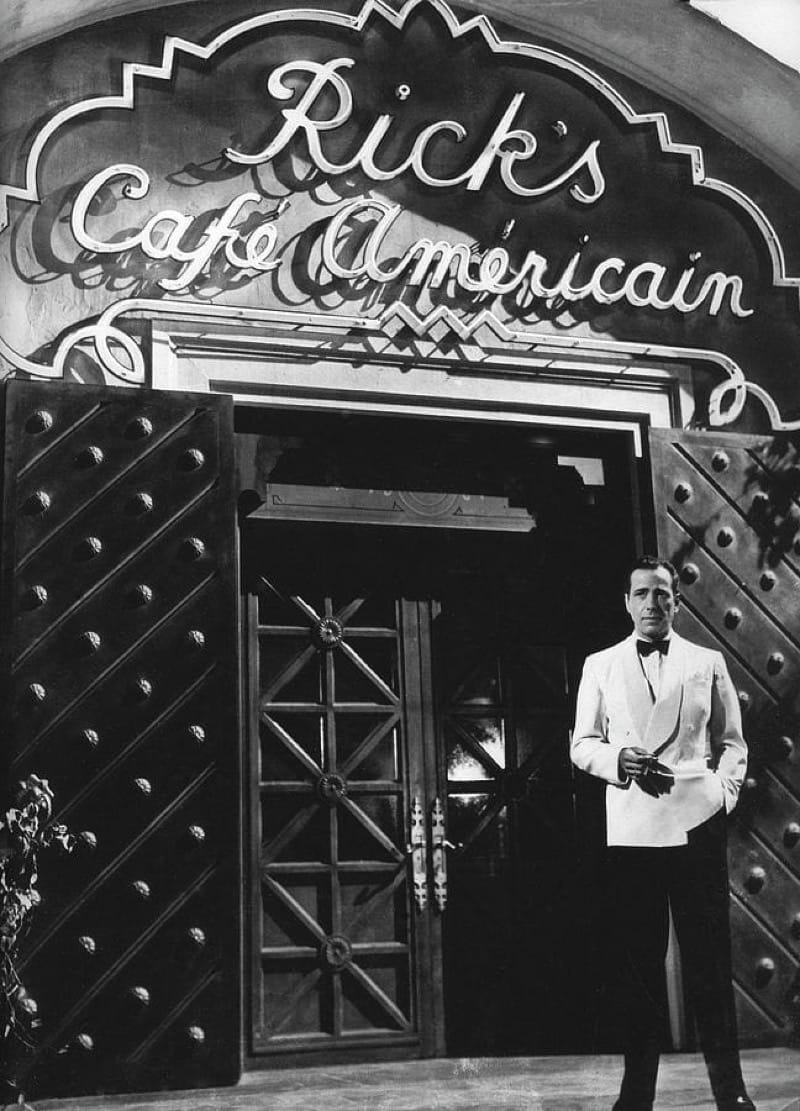
December 1941.
In the city of Casablanca, American expatriate Rick Blaine owns a nightclub and gambling den called Rick's Café Américain. Attracting a wide variety of clientele, from Vichy French and Nazi German officials, soldiers, expats, tramps and thieves, from the rich, to the poor, to those who prey on them all, and everyone in between, it is the place to be in the fabled White City. As its proprietor, Rick claims that he and his bar is neutral in the conflict that is currently consuming the entire world, but he also has a history of running guns in Ethiopia in 1935, and he also fought on the Loyalist side in the Spanish Civil War.
But in addition to providing some much needed drinks and entertainment, Rick's Café Américain is also a place to do some business, any kind of business, legal and illegal alike. So when a smalltime crook named Ugarte asks Rick to hold onto some letters of transit that were taken off a pair of murdered German couriers, it’s just another day in Casablanca. These papers are valuable, as they allow the bearers to travel freely within German-occupied Europe, as well as to neutral Portugal, which would then allow for passage to the United States, so Ugarte plans to sell them for a pretty penny to a contact that he will be meeting at the club later that night.
But before he can make the meeting, Ugarte is arrested under the order of Captain Louis Renault, the local and unabashedly corrupt police captain. When Ugarte dies in custody without revealing that Rick has the letters, that's just more business as usual, not to mention a potential unexpected windfall for Rick.
But then she walks in.
Ilsa Lund.
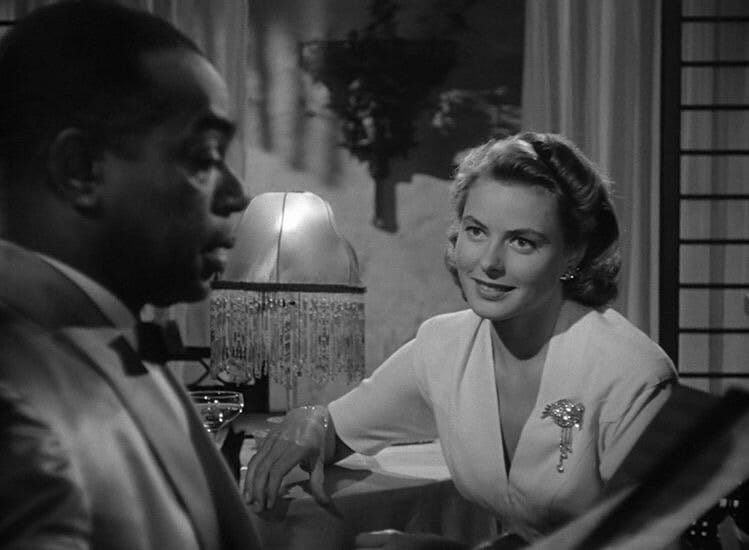
When Ilsa sees Rick's long-time friend, Sam, the Cafe’s house pianist, she asks him to play "As Time Goes By“ for her. This instantly draws Rick over, furious that Sam would play a song that he had ordered never be played again in his place, and he is stunned to see Ilsa there.
Once, years ago, she and Rick were very much in love. In fact, The last time Rick saw her was right before she ghosted him in Paris for another man. At the time, he was not able to confront her about this, as he was forced to leave, mere steps ahead of the Gestapo. Now, all this time later, Ilsa is a member of the Resistance, fighting against the Nazis. But as the Nazis tighten their grip on Europe, the Resistance is smashed, and Ilsa and her husband, Victor Laszlo, are on the run, trying to get to the United States. Bad news for them, it looks like their luck has run out, as they're stuck in Nazi-controlled Casablanca, with the Nazis are hot on their heels, which is bad news for Rick too, because Victor Laszlo is the man Ilsa left him for.
But as luck would have it, Laszlo and Ilsa are the ones Ugarte was going to sell the letters to transit to.
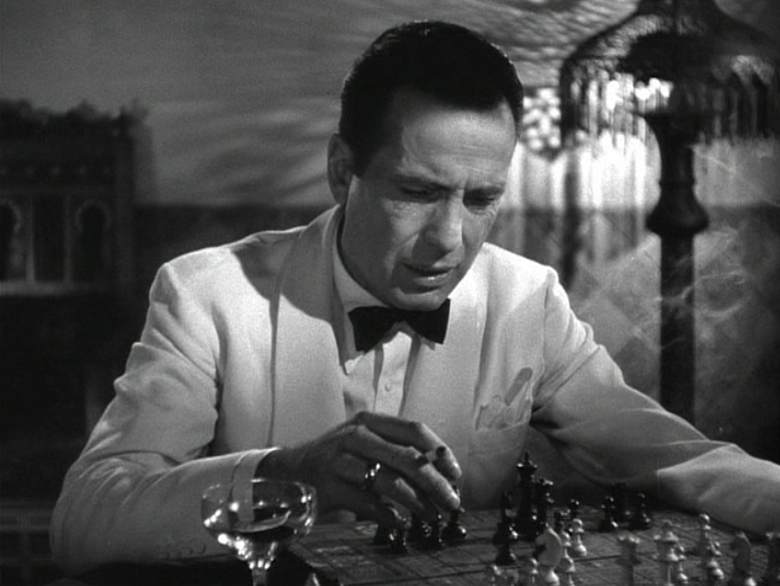
But at first, when Laszlo offers to buy the letters, Rick refuses, citing the risk, but really, it’s because fuck that guy. But then they’re interrupted by the Nazis singing "Die Wacht am Rhein” down in the cafe. Disgusted by the mere presence of these inhuman monsters and their bullshit oompahpah music, Laszlo leads the club in singing "La Marseillaise,” drowning out the dirty Krauts, who all sullenly return to their seats like whipped dogs. It’s a small victory, sure, but it's always a worthwhile effort to spit in a Nazi’s eye, even if it means that the Nazis then have Rick's club closed down because they’re butthurt.
After that, it's a bit more personal for Rick, and a series of crosses and double-crosses later, and a little bit of closure too, all while lives hang in the balance, we all end up at the foggy fields of the Casablanca airport. In the end, Rick makes Ilsa board the plane to Lisbon with Laszlo, telling her that she would regret it if she stayed, "Maybe not today, maybe not tomorrow, but soon and for the rest of your life." And as the pair flies away, Rick shoots a Nazi dead, because you should never miss the chance to do a good thing.
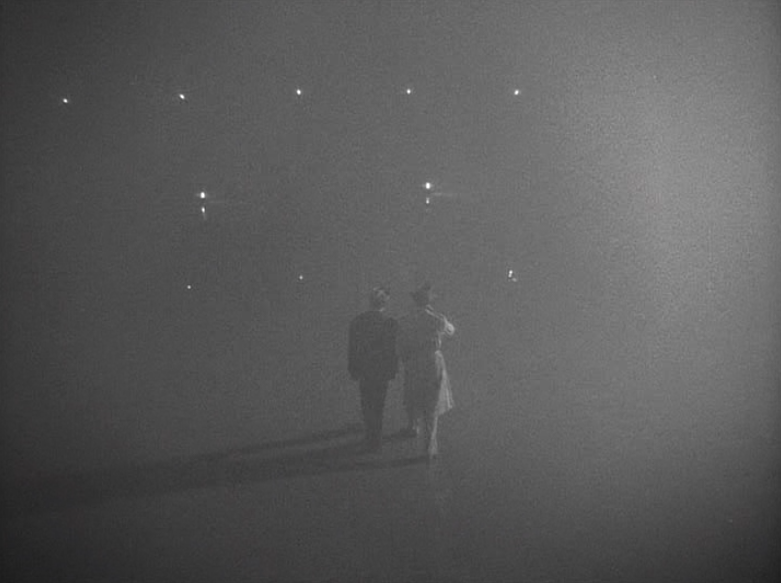
As far as movies go, Casablanca is simply iconic.
It’s been said that this film has “more corn than in the states of Kansas and Iowa combined, but when corn works, there's nothing better." And that’s so true. I still get shivers every time I watch the scene where the whole bar sings down the Nazis, and the French anthem thunders over the gutteral stain of Nazi nationalist pride. And the moment where the Nazi implies that Germany will soon do the same as it did to Europe to the United States, and Rick replies with a little smirk in the face of that bluster, saying, "Well, there are certain sections of New York, Major, that I wouldn't advise you to try to invade.” Yeah, come get some, Nazi.
I love that so much.
Apparently, the possibility was discussed of having Laszlo killed in the end, allowing Rick and Ilsa to leave together, but the fact they don't do that is why the ending is so good. This is Rick letting go of what he wants, recognizing that his own comfort, his own desires, are sometimes not as important as what's good for the rest of the world. "I'm no good at being noble, but it doesn't take much to see that the problems of three little people don't amount to a hill of beans in this crazy world." This is called a sacrifice. It's not fun, it hurts, but it's the right thing to do, because in love, as in war, there are no clean, painless resolutions, choices must be made. As the film shows us, neutrality is never truly neutral, because the reality is, you're not picking your battles, you're picking your side.
If only all the "good" White Americans out there had been as capable of having a similar courage, to stand up to evil when their moment came, even if that moment was merely saying no when it came to the question of whether or not they should enable and excuse their bigoted loved ones, and whether or not they should join those racist fuckers and break bread during regular "no politics" gatherings.
I guess Rick Blaine is just a better person then them.
But to be fair, it also wasn't really ever an option to have Ilsa leave Laszlo for Rick, as at the time, the Motion Picture Production Code did not allow for a film to show a woman leaving her husband for another man.
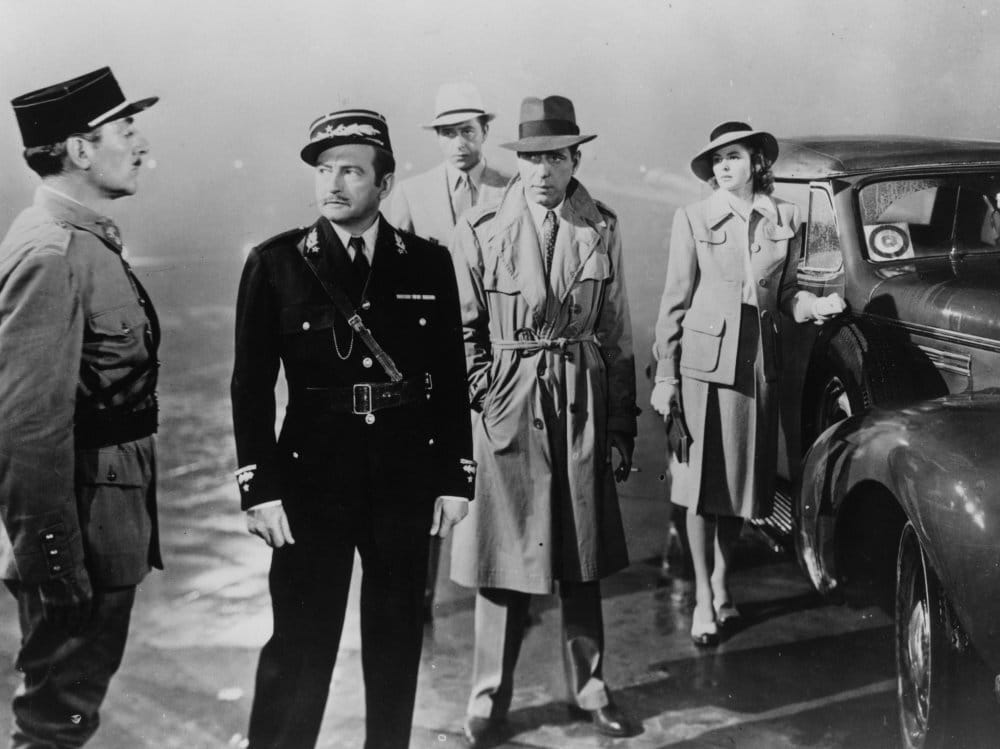
Casablanca was the film that very unexpectedly first showed me, years ago, that "simpler times" were never actually simple, that the people in these older movie were really no different from how they are now, that it's always been the same shit, just on a different day. And also that, fuck Nazis and the pieces of shit that enable them has always been what good people believe. An eye-opening experience for me, it led to me engaging with a lot of older films I had previously eschewed.
That attitude is not uncommon. A lot of people dismiss older films out of hand. There's a fear of sorts of films from previous eras, a belief that these films are all inherently uninteresting and have nothing relevant to say anymore. People believe they already know all the cliches and the dumb jokes, expecting a certain style of staid filmaking, featuring boring pacing, out-of touch naivety, and most of all, the ugly and gross general attitudes and beliefs of a shitty racist and patriarical society, and they're not always wrong either. Although, honestly, this last part especially is something that I find shockingly much more common whenever I watch films and tv shows from the 1990s and early 2000s.
And one thing I've noticed, over the years, having talked movies with a whole bunch of folks, is that often times people who have never seen Casablanca will still use it as their go-to default example for the kind of "old black and white" films that they are generally not interested in.
And the reality is, those people simply couldn't be more wrong. Casablanca is a film with a surprising depth and sophistication of emotion, it's a film of incredibly relatable characters, and it presents its issues in such an easily understandable way that it transcends its specific time and place, and not just because a big part of it is about how fucking shitty Nazis are.
But the simple truth is this...
The reason people use this film as a kind of short-hand stand-in for the "older" films they're dismissing is because of how iconic it is, of how easily it's recognized, even by people who have never seen it. Casablanca came out 80 years ago, and it's still a well-known pop culture touchstone, and it's because it's that great a time at the movies. Yeah, yeah, it's a straight-forward, basic, and baldly earnest film. And sure, okay, it's centered on a schlocky, melodramtic romance, but it's also a clear refutation of cynicism. I don't know about you, but I really like that. Like I said, all those voices raised together, as La Marseillaise fills Rick's Café Américain?
It always gets me right in the feels.
And more than that, Casablanca is one of the greatest films about anti-fascism ever. Released in the middle of World War II, when victory over fascism was far from guaranteed, it stood tall on the world stage and raised a middle finger to all of Nazi Germany and its allies (including American "hero" Charles Lindbergh, as well as the Bush family, amongst many others in White America). In a time of strife and uncertainty, it unapologetically pledged itself to the ideals, as well as committed itself to making the necessary sacrifices, required to stop the totalitarian darkness that threatened to engulf the entire planet.
Casablanca is a more than a movie about love and sacrifice, it's trumpeting its intention to stand with the Free World. It's about finding a cause worth killing for, which as screenwriter Murray Burnett said, is “true yesterday, true today, and true tomorrow."
Simply put, Casablanca is one of the greatest films of all time.

If you haven't seen it, you should check it out.
